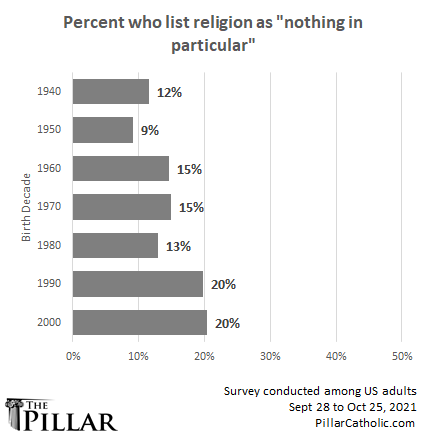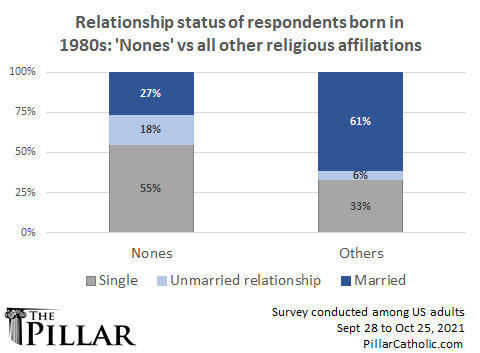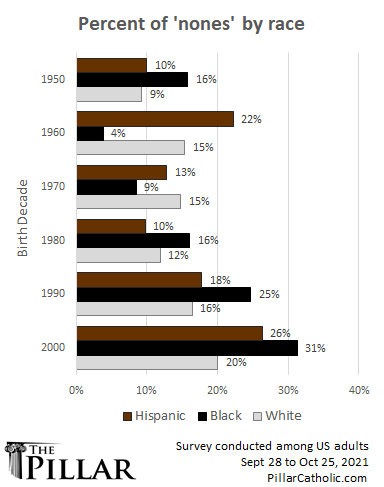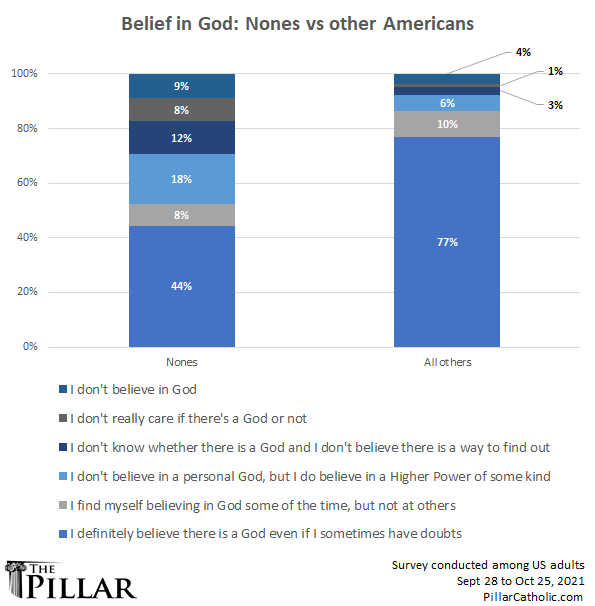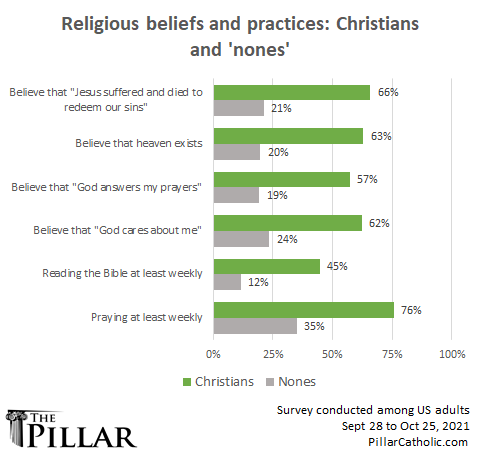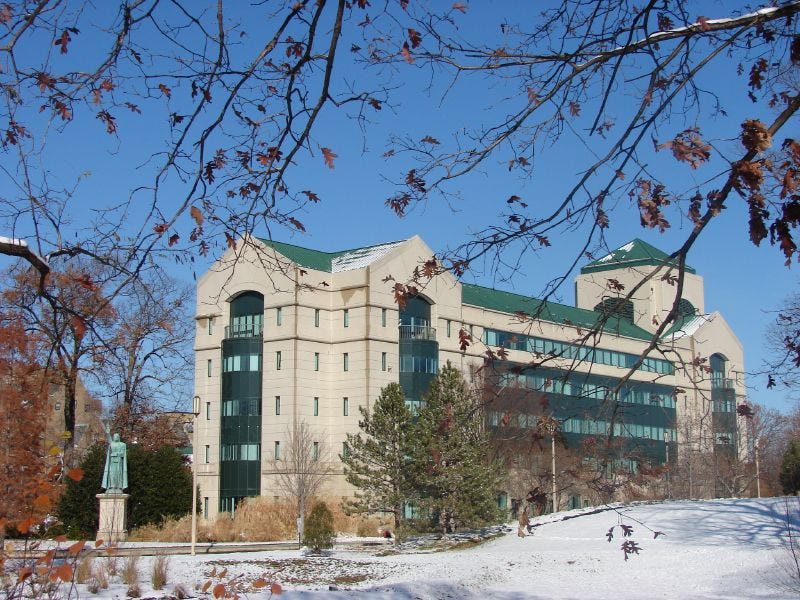
Americans in their twenties are more likely to say they have no religion than to say they are Catholic, according to The Pillar Survey on Religious Attitudes and Practices, a poll conducted last month of a nationally-representative sample of American adults.
On the whole, 14% of Americans describe their religious affiliation as “nothing in particular.” Among those born in the 1990s and 2000s that number rises to 20%. By comparison, 19% of Americans born in the 1990s say they are Catholic, and only 12% of adults born in the 2000s identify as Catholics.
Americans who identify with no religious affiliation are not necessarily atheists or agnostics, who constitute a self-identified 7% of the U.S. population, The Pillar’s polling found.
In fact, 44% of “nones” say they definitely believe in God, 23% say they believe God cares about them, and 20% believe Jesus suffered and died to redeem our sins.
But the data shows that “nones” are estranged from both organized religion and from other institutions in society in a distinctive way. In many ways, they could be seen as among those groups “at the margins” of whom Pope Francis speaks, at least according to their responses to The Pillar Survey on Religious Attitudes and Practices, which we present this week in a series of reports.
In part one of this series, The Pillar looked at America’s changing religious landscape. In part two, we look at what factors influence lifelong Catholic religious practice, and why people say they leave the Church. In part three, we’ll take a look at what can be learned about religiously disaffiliated Americans.
If you’re interested in the technical details of our survey work, here they are: The Pillar worked with research firm Centiment to conduct the survey, which was conducted online with 2653 members of Centiment’s nationally representative research panel. This included a nationally representative sample of 1564 Americans and an oversample of 1089 additional respondents who had been raised Catholic, which we used in order to better understand those raised Catholic who still identify as Catholic, and those who now call themselves members of other faiths or of no faith at all. We’ll publish our full-data set later this week.
Based on our sample sizes we are able to draw conclusions about the overall U.S. population and the Catholic population with a margin of error of +/- 3%. With regard to the population of ex-Catholics, our margin of error is +/- 4%.
An age of alienation
What is perhaps most well-known is that “nones” are disproportionately young.
Among people born from 1960 to 1989, “nones” make up 14% of our national sample. But among those born since 1990, 20% of respondents say they have no religious affiliation.
Among those born since 1990, more people identify as “nones” than as Catholics.
“Nones,” it turns out, are not only disaffiliated from religion. They are also less likely to participate in other institutional social relationships, compared to peers in the same generational cohort.
“Nones” born in the 1990s are 11% less likely than others their age to be in any relationship at all. They are more likely to be in unmarried relationships, but 15% less likely to be married.
Among respondents born in the 1980s, the pattern is even more pronounced. “Nones” born in the 1980s are 22% more likely to be single and 35% less likely to be married; they are three times more likely to be in unmarried relationships than their generational peers.
“Nones” also have fewer children. Forty-nine percent of the “nones” in our national survey who were born in the 1980s — now between the ages of 41 and 32 — have no children. Among respondents identifying with a religious identity, only 31% of that generational cohort have no children.
The average “none” born in the 1980s has 0.94 children, compared to 1.57 children for those with other religious affiliations. Even comparing “nones” to people who specifically describe themselves as atheists or agnostics is interesting, those born in the 1980s who claim some definite label of unbelief have an average of 1.14 children.
People who describe their religious affiliation as “nothing in particular” have less education than either atheists and agnostics or people who claim some specific religious belief. Among those born in the 1990s, 20% of “nones” had college degrees of some kind (associate, bachelor, or graduate), compared to 42% of atheists and agnostics and 48% of those who identified with a particular religious faith.
Those with no particular religious affiliation also earned less than their peers. Among those born in the 1990s, 61% of nones reported an annual household income of less than $50,000, compared to 57% of others.
Among people born in the 1980s, the difference became more pronounced, with 67% of “nones” reporting an annual household income under $50,000, compared to 43% of other respondents.
“Nones” born in the 90s are also less connected to mainstream political parties and the political process than others their age.
When asked “Thinking of the last several elections, for which party’s candidates do you usually vote?”, “nones” were nearly twice as likely to respond “I do not usually vote” and they were 4% more likely to align with third parties than their generational cohort.
In response to another question about how they would classify their politics on a scale ranging from “very conservative” to “very liberal”, 16% of “nones” born in the 90s chose the response “Don’t know” as compared to 9% of other respondents.
The increase in those who list their religion as “nothing in particular” among younger generational cohorts was most pronounced among Black and Hispanic respondents.
This was an unexpected result, given that church attendance rates among Black Americans are higher than the rest of the U.S. population. But we compared the results of The Pillar’s study to data about the racial identity of “nones” in the Cooperative Election Survey (a 61,000 respondent national survey which asks several religious affiliation questions) and found similar results.
The portrait of the “nones” that emerges from our data in many ways points to people who are, in the words of Pope Francis, at the peripheries — the place where the pope calls the Church to be.
While “nones” are an increasingly large percentage of younger Americans, they are less affluent, less educated, less likely to be married, less likely to have children, more likely to belong to racial minorities, and less likely to fit within mainstream political parties and movements than others their age.
What nones believe
We define the “nones” by their alienation from institutional religion, but many of them do believe in God.
In addition to the 44% who “definitely” believe in God, 8% say that they find themselves believing in God sometimes but not at others, and another 18% describe themselves as not believing in a personal God but still believing in a higher power of some kind. That makes 70% of “nones” who believe in God or in a higher power.
Another 12% are agnostics, saying they don’t know if there is a God and don’t believe that there is a way to find out -- a position that only 3% of the rest of Americans hold -- while 8% say they don’t care if there’s a God, an opinion that only 1% of others hold.
“Nones” also participate in religious activities and often hold Christian beliefs, though at lower rates than professed Christians. Thirty-five percent say that they pray at least weekly. Twelve percent say they read the Bible at least weekly. And between 19% and 24% believe that God cares about them, that God answers their prayers, that heaven exists, and that Jesus suffered and died for their sins.
However, the “nones” also have serious skepticism about religious authority. Eighteen percent agreed with the statement: “Heaven and hell are just ideas used by humans to threaten others”, a claim that only 7% of self described Christians agreed with.
Twenty percent say the Bible is a collection of human writings which tells us about God but may contain some errors. And another 15% say that the Bible is a spiritual book which contains some wisdom, just like the Hindu Vedas, the Buddhist Tipitaka, or the Quran.
As the Church seeks to fulfill its mission of evangelization, especially those who are socially marginalized, the “nones” are clearly both a priority and a challenge. Alienated from relationships, from religion, and from politics; poorer, less educated, made up of a larger percentage of minorities than the rest of Americans, the "nones" seem precisely those to whom Catholics are called to proclaim the Gospel, and stand in solidarity.
To do that well, it may prove important to understand why it is that most “nones” believe in God or in some higher power, but have a distrust of religion and religious leadership.
Part one of this series brought you a look at overall trends in the American religious landscape. Part two told you why some people raised Catholic leave the faith, and others stay. Part four, tomorrow, will look at the numbers on the Church and the pandemic. Don’t miss it.

